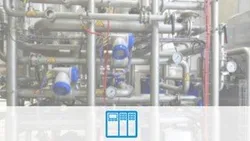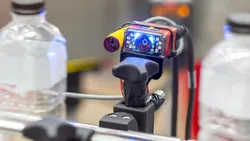
Intro to PLC Programming - FREE 
This free course provides an introduction to PLC programming, allowing users to create their first PLC program. Gain the knowledge and skills needed to understand the basics of PLCs and start programming. ▼
ADVERTISEMENT
Course Feature
![]() Cost:
Cost:
Free
![]() Provider:
Provider:
Udemy
![]() Certificate:
Certificate:
Paid Certification
![]() Language:
Language:
English
![]() Start Date:
Start Date:
On-Demand
Course Overview
❗The content presented here is sourced directly from Udemy platform. For comprehensive course details, including enrollment information, simply click on the 'Go to class' link on our website.
Updated in [February 21st, 2023]
Learners can learn the basics of PLC programming and ladder logic from this course. They will gain a solid foundation in PLC programming and ladder logic, which is in high demand in the industry. They will also learn about digital PLC programming, ladder diagrams, and ladder logic. Additionally, they will be able to create their own PLC program and understand the basics of electrical circuits. The course is designed to be accessible to those with no prior knowledge of PLCs, and experienced technicians and electricians will also benefit from the course. Students will be able to gain valuable feedback from other students who have taken the course, and will be able to apply their knowledge to real-world scenarios.
[Applications]
Upon completion of Intro to PLC Programming - FREE, students will have a solid foundation in PLC programming and ladder logic. They will be able to apply their knowledge to create their own PLC programs and understand the basics of digital PLC programming, ladder diagrams, and ladder logic. With this knowledge, students will be able to pursue further PLC programming experience and be in high demand in the job market.
[Career Paths]
1. Automation Engineer: Automation Engineers are responsible for designing, developing, and maintaining automated systems and processes. They use PLCs to create and program automated systems, and they must be knowledgeable in the latest technologies and trends in automation. As automation technology continues to evolve, Automation Engineers will need to stay up to date with the latest advancements in order to remain competitive in the job market.
2. Robotics Technician: Robotics Technicians are responsible for the maintenance and repair of robotic systems. They must be knowledgeable in PLC programming and be able to troubleshoot and repair any issues that arise with the robotic systems. As robotics technology continues to advance, Robotics Technicians will need to stay up to date with the latest advancements in order to remain competitive in the job market.
3. Control Systems Engineer: Control Systems Engineers are responsible for designing, developing, and maintaining control systems. They use PLCs to create and program control systems, and they must be knowledgeable in the latest technologies and trends in control systems. As control systems technology continues to evolve, Control Systems Engineers will need to stay up to date with the latest advancements in order to remain competitive in the job market.
4. Industrial Automation Technician: Industrial Automation Technicians are responsible for the installation, maintenance, and repair of industrial automation systems. They must be knowledgeable in PLC programming and be able to troubleshoot and repair any issues that arise with the automation systems. As industrial automation technology continues to advance, Industrial Automation Technicians will need to stay up to date with the latest advancements in order to remain competitive in the job market.
Pros & Cons

Clear explanation

Good introductory course

Great course for experienced users

Last few lectures need improvement

Explanation not clear enough

Conveyor motor needs improvement
Course Provider

Provider Udemy's Stats at AZClass
Discussion and Reviews
0.0 (Based on 0 reviews)
Explore Similar Online Courses

Animating with Principle

Animation: Make a Paper Puppet for Stop-Motion!

Python for Informatics: Exploring Information

Social Network Analysis

Introduction to Systematic Review and Meta-Analysis

The Analytics Edge

DCO042 - Python For Informatics

Causal Diagrams: Draw Your Assumptions Before Your Conclusions

Whole genome sequencing of bacterial genomes - tools and applications

PLC Memory Organization

PLC: Industrial Sensors


Start your review of Intro to PLC Programming - FREE